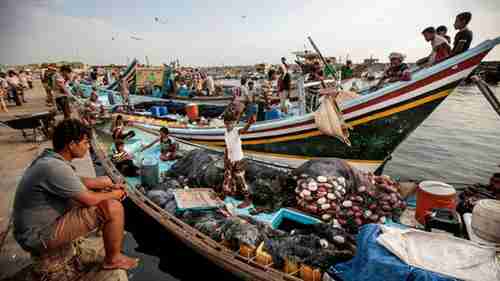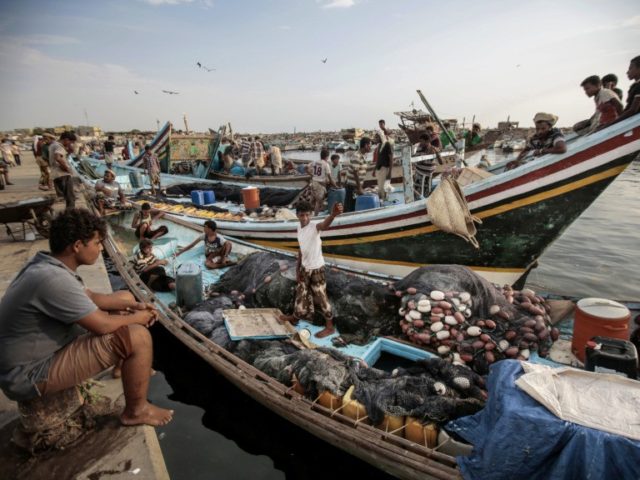This morning’s key headlines from GenerationalDynamics.com
- Ceasefire in Hodeidah seaport in Yemen war holds on the first day
- The Jamal Khashoggi murder continues to affect the Yemen war
Ceasefire in Hodeidah seaport in Yemen war holds on the first day

Fishermen in the the seaport of Hodeidah on September 29 (AP)
Much to the surprise of many people, including me, both sides in the Yemen war agreed to a ceasefire to begin on Tuesday, December 18, and after one day it seems to be holding.
This follows months of heavy fighting in Yemen’s seaport city of Hodeidah in the proxy war between Yemen’s official internationally-recognized government, backed by Saudi Arabia and United Arab Emirates (UAE), and the Houthi rebels, backed by Iran. The ceasefire agreement was reached last week at U.N.-brokered talks in Stockholm, Sweden.
The war began in 2015, when Houthi rebels from northwest Yemen took control of the capital city Sanaa and seized the international airport. In response, warplanes from a mostly Arab coalition led by Saudi Arabia bombed Houthi rebel targets.
The war escalated substantially in November of last year when the Houthis launched a ballistic missile, undoubtedly supplied by Iran, that reached the King Khalid International Airport near Riyadh, about 800 km from the Yemen border. The Saudis reacted with their own escalation, a blockade of all of Yemen’s land, sea, and airports.
The Houthis increased their missile attacks on Saudi cities and then, in June of this year, Saudi Arabia and UAE launched a “catastrophic” assault on Port Hodeidah in Yemen. The objective was to cut off supplies of Iranian weapons to the Houthis as well as a source of income.
The Hodeidah deep sea port on the Red Sea has become a crucial asset to the Houthi’s war effort. NGOs use the port to import badly needed humanitarian aid, including food, water, and medicines, for 8 million Yemenis. The Houthis control these imports and charge duties that fund their war efforts. Furthermore, the Houthis use the port to import Iranian weapons for the war effort.
The blockade of the seaport may have been effective in preventing money and supplies from reaching the Houthis, but it also created the worst humanitarian disaster in the world today, since food, water, and medicines could no longer reach Yemen civilians.
Tuesday’s ceasefire is not a peace deal. It is a temporary ceasefire that both sides have agreed to so that humanitarian aid – food, water, and medicines – could be imported into Yemen to alleviate the humanitarian disaster. There are international efforts to extend the ceasefire into a complete peace deal but, assuming that cannot be done, the ceasefire may end as quickly as it started. PBS and Sky News and National Interest
The Jamal Khashoggi murder continues to affect the Yemen war
Every day we read about slaughter, torture, rapes, jailings, and atrocities being perpetrated in many countries around the world, so it is still startling to see how the murder of one man on October 2, Saudi national Jamal Khashoggi, in the Saudi embassy in Istanbul, Turkey, is even still remembered today, over two months since it happened.
If Saudi Arabia’s Crown Prince Mohammed bin Salman (MBS) had simply hired a hit man to shoot him dead in the street outside the embassy, it would have been an ordinary murder of the kind that leaders like MBS, Erdogan, and others regularly order. Instead, Turkish intelligence sources claim MBS arranged for something out of a horror movie – kill him, dismember him, dissolve the pieces in acid, ship what is left out of the country – and if I did not know that atrocities like that are common these days, I would think it was impossible. But it is possible and that is why so much of the world has turned against MBS.
There are two reasons why both sides in the Yemen war agreed to the ceasefire deal.
First is the humanitarian situation. We are used to wars where the atrocities have become unbelievably bad and nobody cares. But in the case of Yemen, it seems that people on both sides do care – enough to permit a few days of ceasefire and opening of the Hodeidah port to relieve at least some of the suffering.
Also, I cannot prove this, but reading and listening to news reports has given me the impression that the two sides fighting the Yemen war do not have the same level of vitriolic hatred for one another as, say, the two sides in the Syrian war. I read and hear lots of news reports about battles and wars in lots of countries, and there is no question that this war has been extremely bloody, but there seems to be something lacking in the level of vitriolic hatred. As I said, this is a feeling, and I can’t prove it.
The second reason is that the Khashoggi murder has motivated the Senate in Washington to pass a resolution directing President Trump to end American support for the Saudis in Yemen. The measure is purely symbolic since it would be vetoed, but the fact that the Senate passed it has put pressure on MBS to agree to a ceasefire.
The U.S. has a long-standing relationship with Saudi Arabia, dating back to the 1930s, where the U.S. is committed to providing security while the Saudis are committed to providing oil. The relationship has lasted through many crises and, in the end, no one in Washington wants this to be the crisis that ends it. AP and Washington Post and Axios
Related Articles:
- The Jamal Khashoggi murder changes the direction of the Yemen war (08-Nov-2018)
- Saudi Arabia and UAE launch a ‘catastrophic’ assault on Port Hodeidah in Yemen (15-Jun-2018)
- Yemen’s Houthi missile attack on Riyadh called a ‘dangerous escalation’ (06-Nov-2017)
- Saudis target women and children in Yemen to make them ‘shiver’ for generations (28-Aug-2018)
- Iranian advisors are ‘on the ground’ with Houthis in Yemen, supplying weapons and intelligence (06-Jan-2018)
- Brief generational history of South Yemen (29-Jan-2018)
KEYS: Generational Dynamics, Yemen, Hodeidah, Saudi Arabia, United Arab Emirates, UAE, Iran, Houthis, Turkey, Recep Tayyip Erdogan, Jamal Khashoggi, Mohammed bin Salman, MBS
Permanent web link to this article
Receive daily World View columns by e-mail

COMMENTS
Please let us know if you're having issues with commenting.